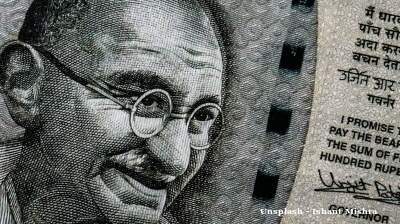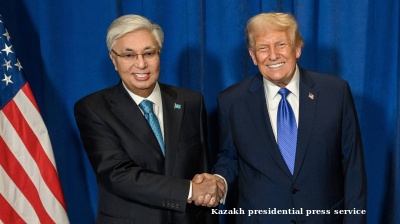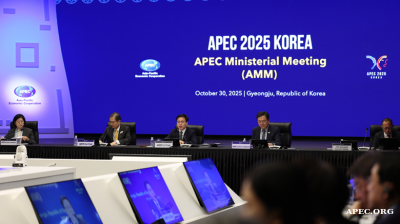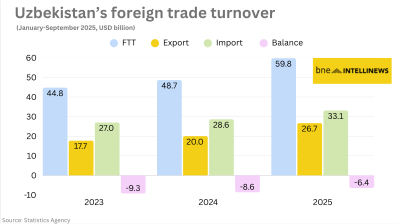Uzbekistan started out 2020 as The Economist’s “Country of the year” as efforts to transform what just four years ago was still basically something like an old-fashioned post-Soviet dictatorship, dismantle trade protectionist policies and develop the beginnings of a free market bore much fruit.
The coronavirus-afflicted year that has just passed obviously proved a setback for the pace of the transformation engineered by Shavkat Mirziyoyev, the former prime minister who succeeded despot for 27 years Islam Karimov in late 2016, but Uzbekistan’s “Third Renaissance”—as the presidential administration refers to it—is far from derailed.
MACRO
Despite the impact of the coronavirus (COVID-19) pandemic, Uzbekistan is still set to achieve growth, amounting to 0.7% in 2020, with a bounceback to 5.0% in 2021, according to the October update of the International Monetary Fund’s World Economic Outlook. The country’s finance ministry, meanwhile, remains a tad more optimistic about likely 2020 GDP (see below). The World Bank by its October upate was expecting something similar to the IMF, with Marco Mantovanelli, World Bank country manager for Uzbekistan, saying: “Despite the current challenges, the authorities have reconfirmed their strong commitment to continue reforms in key sectors of the economy to achieve stronger growth and improve wellbeing of citizens. This is very important to ensure a more resilient and inclusive post COVID-19 recovery.”
|
Macroeconomic indicators |
2019 |
2020 (forecast) |
2021 (forecast) |
|
GDP growth |
5,7% |
1-1,5% |
5,1% |
|
Inflation |
15,2% |
11-11,5% |
9-10% |
|
Unemployment |
9% |
11,1% |
n/a |
|
CPI |
13,5% |
12,5% |
9-10% |
|
Foreign trade balance |
$41.8bn |
$38.6bn |
$41.9bn |
|
Foreign direct investments |
$6.51bn |
$6.63bn |
$7.81bn |
Source: Uzbek Finance Ministry for above and all graphs and tables below.
To push back against the coronavirus health and economic emergency, the government adopted an action plan to restore economic growth and stick with systemic structural reforms (see below). In late October, Renaissance Capital put out a report, “Economy of Uzbekistan: Golden case”, pointing out that the country had maintained a stable fiscal and external position, had strengthened its strategic external partnerships and has significant reserves. It noted that the active sale of gold, combined with timely financial support from various development institutions and an impressively steady influx of remittances, softened the depreciation of the Uzbekistani som (UZS), and Uzbekstan had ensured the growth of international reserves, which were enough to cover 20 months of imports. "In our view, the main problems that Uzbekistan needs to solve are the large share of the informal economy, the still dominant share of the public sector, and the lack of political diversification,” Renaissance said.
Two months ago, the government acknowledged the level of concern about the shadow economy. Mirziyoyev signed a decree aimed at cutting it back by around a third in the medium term and improving the efficiency of the tax authorities. The State Tax Committee estimated that the informal economy constituted 48% of GDP (UZS 245 trillion or $24bn).

Uzbekistan’s population is not only by far the largest in the region at towards 34mn; it is, unlike most of its peers in the Former Soviet Union (FSU), also very young. Amongst the government’s greatest challenges is simply to find work for this youthful population. “Uzbekistan has no choice. It has to open to the world to create jobs, to stop the brain drain, to provide opportunities for the young people,” Scott Osheroff, chief investment officer of Asian Frontier Capital (AFC), told bne IntelliNews on the eve of the country’s 29th anniversary of independence in September.
Official forecasts show the Uzbek annual inflation rate by the end of 2020 as around 11.0-11.5%, with a decline to 8-11% seen in 2021. The World Bank anticipates 13% at end-2020 and 10.7% by end-2021, compared to 14.5% at end-2019.

As with all of Central Asia and beyond, the pandemic triggered border closures, restrictions on transportation and logistics and stoppages at many enterprises, making for a major impact on foreign trade volumes. Imports in 2020 appear to have fallen by around 14.0%.

Slowing growth in the attraction of foreign direct investment and credits, to 1.8%, has also been pencilled in for 2020. If a recovery in this area can be managed across 2021-2023, the main priorities for allocation will be industry, agriculture and large infrastructure projects, officials say.
POLITICS
Uzbekistan will hold a presidential election in 2021, the sixth in its post-Soviet history. Mirziyoyev, 63, who won 88.6% of the vote in the previous contest, is expected to put himself forward for another five years in office.

Mirziyoyev with First Lady Ziroat Mirziyoyeva (Source: President.Uz).
The incumbent will almost certainly promise more opening up to the outside world and global economy. Part of that process hinges on privatisation. Uzbekistan’s first landmark privatisation was completed when 80% of the iconic Soviet Brutalist Hotel Uzbekistan in the heart of Tashkent was sold to Singapore's Bashan Investment Group for $23.2mn in May. A raft of privatisations are on the board for the coming years as the government plans to slowly reduce its role in the economy (see below for more on this).
Like all the Stans, Uzbekistan endeavours to keep both regional giants, Russia and China, on its side and thus plays a delicate balancing act. December saw Uzbekistan take observer status in the Russia-led Eurasian Economic Union (EEU), though the consensus is that Mirziyoyev is not persuaded, certainly not at this point in time, to go for full membership status of the trade bloc made up of Russia, Belarus, Kazakhstan, Kyrgyzstan and Armenia.
In terms of matters that might knock a point or two off Mirziyoyev’s popularity, Uzbekistan was at the end of the year and the onset of winter forced to suspend gas exports as it became clear the country was having difficulty in supplying its own citizens with both gas and electricity. “We all know that the problems associated with the gas system did not appear in a single day, but have been tormenting us for 30 years. But no one has the right to use this as an excuse. Our people demand gas, most of them pay for it in a timely and honest manner,” the president said, while hitting out at provincial officials. “I don't need grandiloquent words and numbers. Our people themselves in social networks are giving an objective assessment of the work of local leaders,” he added.
In October, Mirziyoyev commented that over half of the power stations in Uzbekistan are worn out and burn twice as much fuel as new combined-cycle plants.
BUDGET
The decline in business activity in Uzbekistan and the slowing of the global economy in the context of the ongoing pandemic have led to a decrease in tax revenues. Continuing uncertainty over the course of the coronavirus crisis from this point onwards exacerbates difficulties in estimating likely government revenues moving ahead.

Indirect taxes are expected to $6bn or 42.6% of state budget revenues and 9.1% of GDP. The main source of revenues (75%) from indirect taxes will be provided by VAT and an increase in revenues from excise tax. Accrued VAT is projected at $4.5bn.

Bread sellers in Urgut (Source: Betta27, wiki, public domain).
Uzbekistan as part of its draft 2021 Citizens’ Budget published a list of the 20 largest taxpayers in the country. Their tax payments are to cover 47.3% of the country’s 2021 state budget revenues. The top 20 is headed by Navoi mining and metallurgical complex—the plant's tax payments next year will amount to 20.1% of tax revenues. Almalik mining and metallurgical complex will provide 6.4%, while oil and gas company Uzbekneftegaz will cover to 5.1%.

Debt
Total public debt by the end of 2021 is projected by the Mirziyoyev administration at $28.4bn (44.9% of GDP), a level officially regarded as moderate and as no threat to macroeconomic stability.

External public debt by the end of 2021 is projected at $25.5bn by the government, of which $18.0bn will be sourced on behalf of the state and $7.5bn will be in government guarantees. External debt in the first three quarters of 2020 amounted to $29.3bn, up 19.7%, or $4.8bn, year-to-date. The figure splits into $18.7bn of public debt, up $2.9bn YTD, and $10.6bn of private debt, up $1.9bn YTD.
Uzbekistan placed dual-tranche sovereign international bonds denominated both in dollars and local currency in the amount of $750mn on the London Stock Exchange (LSE) in mid-November. The 3-year benchmark eurobond yield in Uzbekistani som (UZS) was around 15.250%, while for the 10-year dollar-denominated security the yield was around 4.250%.
Uzbekistan placed its debut eurobond worth $1bn in early 2019 following an extensive marketing exercise in New York, Boston and London.
There are some influential voices in the country arguing that one of the biggest potential threats to Uzbekistan’s economic success in the years to come is over-leveraging, particularly hard currency denominated borrowing that could end in a debt trap.

Under the economic pressure of the pandemic, the government was forced to raise its external borrowing limits in 2020. For 2020, newly arranged external borrowing is projected at $5.5bn, while for 2021 the figure is anticipated by the state as staying within $5bn.
BANKING AND FINANCE
In monetary policy, the Uzbek central bank is targeting annual inflation of below 10% in 2021 and 5% by 2023. It left its main rate unchanged at 14% after a meeting of its monetary policy committee in early December. The central bank also noted that in January to November, Uzbekistan's commercial banks issued $10.7bn in loans.
The regulator's forecasting for macroeconomic development has been conducted on the basis of three different scenarios. The main scenario envisages a gradual recovery of the economy; the optimistic scenario factors in a faster recovery; and the risk scenario counts with a slower recovery.
The central bank was in the news in early November when it commenced selling bars of gold via commercial banks. Bought bullion with its complete serial-coded packaging intact can be taken outside the republic.
On December 6, S&P Global Ratings affirmed its long- and short-term foreign and local currency ratings on Uzbekistan at ‘BB-/B’. The outlook remained negative.
“The negative outlook reflects our view that Uzbekistan’s external and fiscal debt could continue to increase rapidly,” the rating agency said.
It added: “Over the past two years, Uzbekistan has made progress on its reform and economic modernization agenda, which should improve the economy’s productive capacity and the government’s institutional capacity. However, notwithstanding the positive trend in strengthening institutions, in our view, Uzbekistan is starting from a low base. We believe that decision-making will remain highly centralized in the hands of the president, making policy responses more difficult to predict. We believe that checks and balances between institutions remain weak. In addition, uncertainty over any future succession remains, despite the relatively smooth transfer of power to President Shavkat Mirziyoyev in 2016.”
In banking, work continues apace in transforming the sector as part of a system-wide revamp of the country’s capital markets.
“It is no secret that the Uzbek banking sector has been in sleep mode for the last 25 years. The banks were mostly established along sectoral lines to solve specific funding matters and they were focused on two key issues: channelling state funds into the sectors that they have been created for and collecting physical cash,” Fiezullah Saidov, CEO of Uzbekistan Equity Fund and a banking sector consultant for the IFC, said in an extensive comment for bne IntelliNews looking at bank sector reforms. “But since Uzbek President Shavkat Mirziyoyev launched the Uzbekistan 2.0 reforms the transformation and reform of the banking sector has become a key initiative that is probably the most advanced of all the current reform efforts,” he added.
The banking landscape in the country is starting to change drastically. Banks have been freed from their sectoral focus. They are now permitted to do classic banking business with any client they like. And following the introduction of the free convertibility of the som last year, starting with liberalising bank accounts and permitting FX deposits the need to focus on physical cash collection has been removed.
OTHER KEY MATTERS, POINTS OF INTEREST
AFC Capital enters 2021 having determined that Uzbekistan’s once-in-a-generation re-rating of assets is still in its early days. Investors can look forward to a three-to-five-year re-rating of listed equities on the Tashkent Stock Exchange, and an even longer re-rating of the overall economy and real estate market, AFC says.
It adds “Phase II” of the re-rating is approaching, with large and high-quality state-owned enterprises gradually advancing toward privatisation through the stock market. Olmaliq Kon-Metallurgiya Kombinati (TSE: AGMK), a large mining company (also known as AMMC) producing copper, zinc, molybdenum, gold and silver, is one company AFC says to keep your eye on. AGMK also accounts for 90% and 20% of Uzbekistan’s silver and gold production, respectively, and is likely to have a valuation of several billion dollars.
In other privatisation developments, the state asset management agency has announced a plan to sell Uzbekistan’s 57.118% stake in the authorised capital of Coca-Cola Bottlers Uzbekistan. In all, Uzbekistan is moving to fully or partly privatise over 620 state-owned companies and properties to accelerate its transition to a market economy, according to a presidential decree published on October 28. The plans include 32 of the largest state companies, such as energy firm Uzbekneftegaz, gold and uranium miner Navoi Mining and Metallurgy Combine, Uzbekistan Airways, Uzbekistan Railways and the Uzautosanoat (UzAuto Motors) automaker.
A tender for an engineering, procurement and construction (EPC) contractor to revamp the country’s oil refinery at Fergana has been announced in a bid to bring the facility up to modern standards ahead of its sale in the privatisation drive.
Any public asset for sale is to go under the hammer at a starting price of "1 som" with all social and investment obligations.
In renewable energy, the Mirziyoyev administration plans to increase the share of renewable energy sources (RES) in total electricity production to 25% by 2030, with 5 gigawatts of solar energy and 3 GW of wind energy in the mix. In the pursuit of cleaner energy, Uzbekistan is planning to purchase 300 large-capacity all-electric buses for Tashkent within three years under a $96mn project.
The dangers posed to Uzbekistan by potential ecological shocks such as those brought by climate changed were underlined by the inaugural edition of the Ecological Threat Register (ETR), released by the Institute for Economics & Peace (IEP) in September. Uzbekistan was ranked in the “medium exposure” category.
Among foreign investors that managed to get started in Uzbekistan in gruelling 2020 are Hilton, with Hilton Tashkent City; Gruzovichk, the Russian cargo and freight vehicle rental company; Japan’s children’s goods brand Merries; Selectel, which localised its Russian cloud platform; Humans, which a version of its mobile app in Uzbekistan, combining finance, mobile operator services and goods and services showcasing; Volkswagen, offering the Volkswagen Caddy; Russian electronic document player SKB Kontur; Fix Price, a discount store chain; Czech Skoda, with sales of the Škoda Kodiaq, Chinese automaker Haval; Ukrainian food delivery service Zakaz; French supermarket company Carrefour and Georgia’s TBC Bank.
TBC Bank is serving its customers in Uzbekistan mainly via its online platform, Space, while the bank’s “smart, next generation branches will be used primarily for client relationship purposes”.
Companies intending to enter the Uzbek market in 2021 include Kazakhstan’s Magnum Cash&Carry; Pobeda, the Russian low-cost airline and VKontakte, the St Petersburg-based social media and social networking company.

Central Station, Tashkent (Source: Sigismund von Dobschutz, Creative Commons Attribution-Share Alike 3.0 Unported license).
Tashkent as a destination got a boost in November when it placed second in the Worldwide Cost of Living ranking compiled by the Economist Intelligence Unit (EIU).
October saw the establishment of the Uzbek Export Support Fund. It has been allocated $100mn to provide exporters with sums against pre-export financing loans.
November brought an export boost for Uzbekistan in the shape of recognition by the Office of the US Trade Representative (USTR) of Uzbek efforts to stamp out child and forced labour in cotton harvesting. The USTR thus closed its Generalized System of Preferences (GSP) worker rights eligibility review of Uzbekistan, according to an official statement from the organisation. “The ILO monitoring program found no systematic use of child labor in the cotton harvest and a continued decline in forced adult labor for the fifth year in a row,” it said.
In September, Uzbekistan said it was set to launch production of Nike and Adidas sports footwear in Andijan Region. The country’s Uzcharmsanoat Federation has signed multiple deals with the brands, according to its head Fahriddin Boboyev. The agreements are in line with Uzbekistan’s overall goal to develop its textile industry, shifting focus away from plain and simple exports of raw materials used in the textile sector, such as cotton.
The cotton and textile industries in the country have been buoyed by the cancellation of state cotton crop quotas and the lifting of obligations placed on farmers to participate in cotton production. Human rights groups had suggested that the government-imposed quotas prompted local officials to maintain reliance on forced labour in instances where they could not find enough willing workers. Mirziyoyev outlined in January how the government was set to phase out its role in cotton and also wheat trading in order to open up opportunities for private companies in Uzbekistan, one of the world’s top cotton producing countries.
Another trade boost for Uzbekistan—a doubly landlocked nation—could arise if the country can capitalise on the joint Iranian-Indian development of Iran’s sole oceanic port, Chabahar. Uzbekistan is drawn to the idea of using it as a substantial trade gateway.
Features

BOTAŞ and Turkey’s hub ambition: from “30-year dream” to cross-border reality
For Ankara, the symbolism is as important as the molecules: Turkey’s energy map is shifting from end-market to hub.

Indian bank deposits to grow steadily in FY26 amid liquidity boost
Deposit growth at Indian banks is projected to remain adequate in FY2025-26, supported by an improved liquidity environment and regulatory measures that are expected to sustain credit expansion of 11–12%

What Central Asia wants out of the upcoming Washington summit
Clarity on critical minerals and a lot else.




